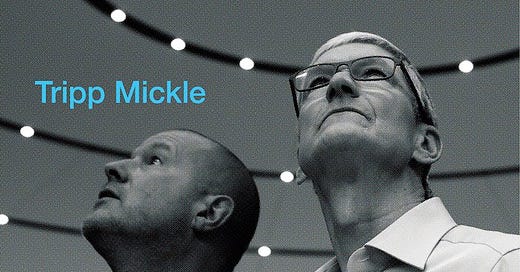Have you read Steve Jobs by Walter Isaacson?
If you enjoyed that, you’ll enjoy this one too. In many ways, this feels like a continuation of that story. Steve Jobs told the origin story—this one picks up from there.
The fascinating part is that Tripp Mickle was able to craft a narrative as compelling as Isaacson’s. And that’s saying something. I rate Isaacson highly, so the fact that Tripp reached that level is remarkable.
When Jobs died, he left behind more than a company—he left behind a cultural powerhouse. Apple wasn’t just making products; it was shaping the culture. Jobs had become the face of the company. He took the spotlight, the credit, the pressure. So when he passed away, many people doubted Apple could survive. They assumed it would collapse without him.
They were wrong. Beautifully wrong.
Before his death, Jobs handpicked his successor: Tim Cook. A supply chain and operations genius—no flair for design or technology like Jobs. To many, it was a strange choice. Jobs had marketed Apple as a tech-forward, design-first company. Now a logistics guy was in charge?
But Jobs gave Cook one key instruction: don’t try to be me. Lead Apple your own way. That was the best advice he could have given.
In the early days, the shadow of Steve Jobs loomed large. Inside Apple, the question was often, “What would Steve do?” But Tim Cook started asking a better question: “What’s the best decision?”
And he kept going.
Quietly, steadily, and deliberately, he began building Apple in his own image. And did it work?
Yes. Yes. Yes, it did.
When Steve Jobs passed, Apple was worth $377.5 billion. Today, it’s valued at $2.97 trillion—the first company in history to hit a trillion, and now nearly eight times what it was. Net income grew from $25.9 billion in 2015 to $93.7 billion today.
Back then, Apple was mainly a hardware company. Today, it’s also a software and services giant. The transformation is astonishing.
Would Steve Jobs be proud of Apple today? That’s the wrong question. Since all humans are mortal, the better question is this: was it good that Apple survived Jobs?
Absolutely. That survival was one of his greatest fears. And the company didn’t just survive—it thrived.
This book tells that story—the evolution, the survival, the transformation. And through it, you can’t help but respect Tim Cook. He’s earned his stripes. Better yet, he’s done it quietly, humbly, and always giving credit to his team—unlike Jobs, who soaked up the spotlight.
Another key figure in the story is Jony Ive, the visionary designer who worked closely with Jobs to develop Apple’s most iconic products. Eventually, he left. It was inevitable. But the relationship he had with Jobs was something truly special, and this book helps you appreciate that.
As for the book title—ignore the subtitle (“...Losing Its Soul”). That’s just marketing. The book itself is fair, balanced, and deeply insightful.
As I read, I found myself getting ideas for changes to make in our own business. That’s what a good book does to you—it sparks something.
So, if you’ve read Steve Jobs by Walter Isaacson, don’t stop there.
Read this one too.





It seems to me that Isaacson's and Tripp's books discussed here are must-reads for anyone who wants to build a business, a company, or an empire that outlives the founder and thrives! Thank you for such an instructive review.